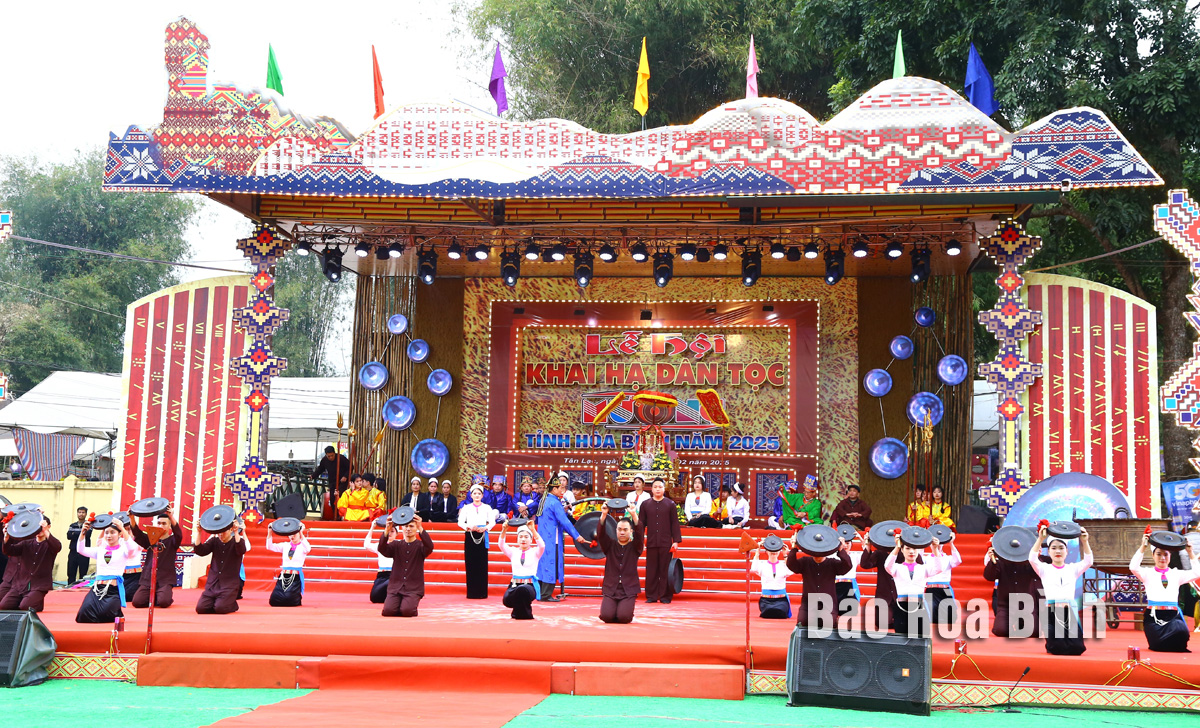
Hoa Binh province has harnessed its rich cultural heritage and human potential to forge the path towards sustainable development in the new era.
The
Khai ha (going down to the field) festival of the Muong ethnic group is held
annually to promote local cultural values.
The province is home to six main ethnic groups,
with the Muong people making up over 63% of the population. Each group
contributes distinctive cultural elements that create a diverse tapestry of
traditions. The locality boasts a long-standing historical and cultural values
with an array of festivals such as Tien Pagoda, Khai ha, Bo Temple, and Xen
Muong.
Besides, the province boasts the world-renowned
Hoa Binh Civilisation that dates back to prehistoric times, along with the four
major Muong regions of Bi, Vang, Thang, and Dong. Standing as a cradle of the
Vietnamese culture, Hoa Binh is now preserving hundreds of bronze drums and
nearly 10,000 precious gongs.
Seeing culture as a motivation for sustainable
development, the province has carried out various measures promote the values
of the Muong ethnic culture and the Hoa Binh Civilisation. It has emphasised
the people as both the centre and goal of development. Given this, the
provincial Party Committee has launched multiple action programmes to cultivate
locals’ ethics, lifestyle, and patriotism. The hardworking, compassionate, and
creative people of Hoa Binh have become the nucleus of all development policies
and also a bridge linking traditional values with the modern time.
According to Director of the provincial
Department of Culture, Sports and Tourism Quach Thi Kieu, Hoa Binh province has
paid due attention to preserving and promoting traditional cultural values. It
is home to 41 national heritage sites, 71 provincially ranked sites, and 303
protected historic and scenic locations. Additionally, 786 elements of
intangible cultural heritage from five ethnic minority groups – Muong, Thai,
Tay, Dao, and Mong – have been documented. One site has achieved special
national relic site status, while five intangible cultural elements have
received national recognition. In particular, a dossier has been compiled to
seek UNESCO's inclusion of the Mo Muong cultural heritage in the list of
heritage in need of urgent safeguarding.
Provincial authorities have implemented
strategic campaigns to attract socio-economic investment while preserving
cultural heritage through Resolution 04-NQ/TU, issued bythe provincial
Party Committee's Standing Board in October 2021, which outlines the
preservation and promotion of local ethnic groups' cultural heritage values for
2021–2025, with a vision to 2030.
The province has also activelypromoted
creativity among the public, resulting in numerous artistic works and cultural
programmes. Notably, it has worked to enhance cultural preservation in tandem
with tourism development. Tan Lac, Mai Chau, and Lac Son districts have become
popular destinations as they are able to capitalise on ethnic culture.
Hoa Binh is advancing by utilising its soft
power – cultural and human assets. Culture has become a strategic force driving
economic development, social stability, and improved living quality for local
residents.
The Standing Board of the Hoa Binh provincial Party Committee has agreed in principle on a proposal by the Standing Board of the Party Committee of Hoa Binh city to gather feedback on the city’s 1:2000 zoning plan, which forms part of its broader urban development strategy.
Hoa Binh province has made notable progress in public administration reform and digital government development, with the satisfaction index among citizens and businesses reaching over 84%, according to recent government evaluations.
Thanks to great efforts by local authorities in recent times, the governance and public administration performance of Mai Chau district has been significantly improved.
In the afternoon of June 6, the Party Committee, the People's Council, the People's Committee and the Fatherland Front of Lac Son district solemnly held a meeting to celebrate the 139th anniversary of the district's founding (1886–2025) and the 79th anniversary of the establishment of the district's Party Committee (1946–2025). There was the attendance of Mr. Bui Van Thang, the Vice Chairman of the Provincial People's Council; Mr. Quach Tat Liem, the Vice Chairman of the Provincial People's Committee; Ms. Dang Bich Ngoc, the Deputy Head of the National Assembly Delegation of the province; as well as the former leaders of the province and district through various periods, who are the natives of the district.
Implementing the Politburo’s Resolution No. 57-NQ/TW on breakthroughs in science – technology, innovation, and digital transformation is a golden opportunity for the northern mountainous province of Hoa Binh to renew growth model, improve competitive edge and shorten digital gap.
Resolution 57-NQ/TW, issued by the Politburo on December 22, 2024, identifies sci-tech, innovation, and digital transformation as strategic breakthroughs to build a developed and prosperous nation. In Hoa Binh province, this spirit is not just a slogan, it’s being put into action through concrete initiatives that form a "new development triangle”: digital citizenship, digital economy, and digital administration.



